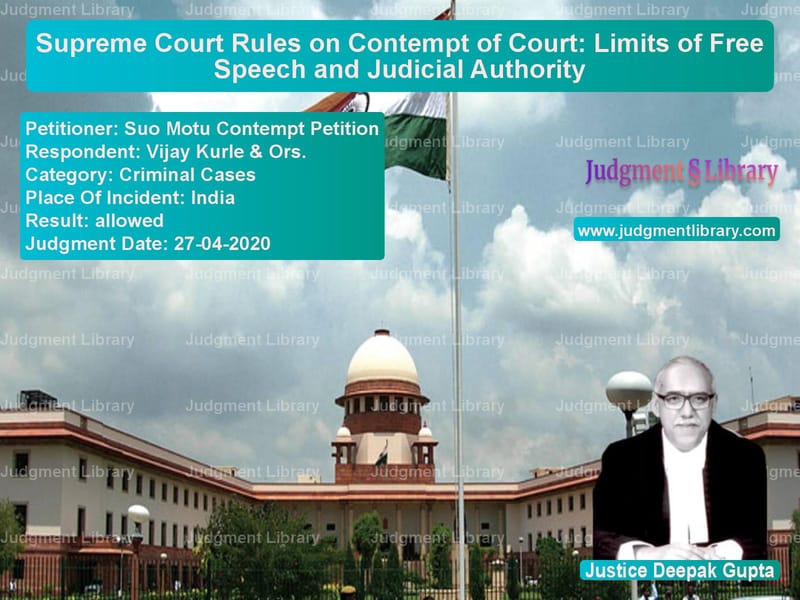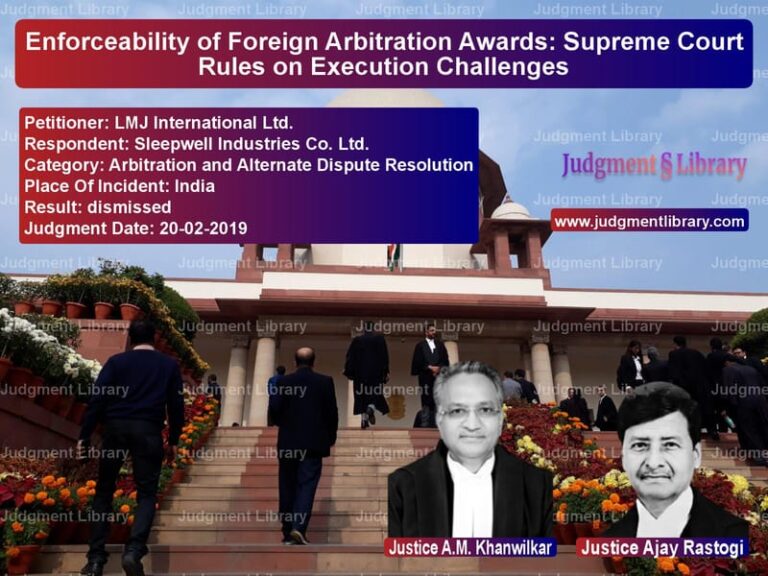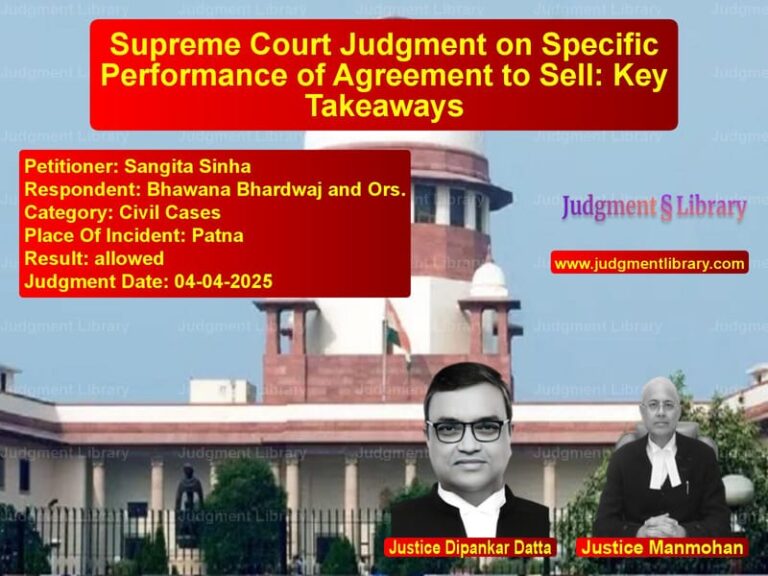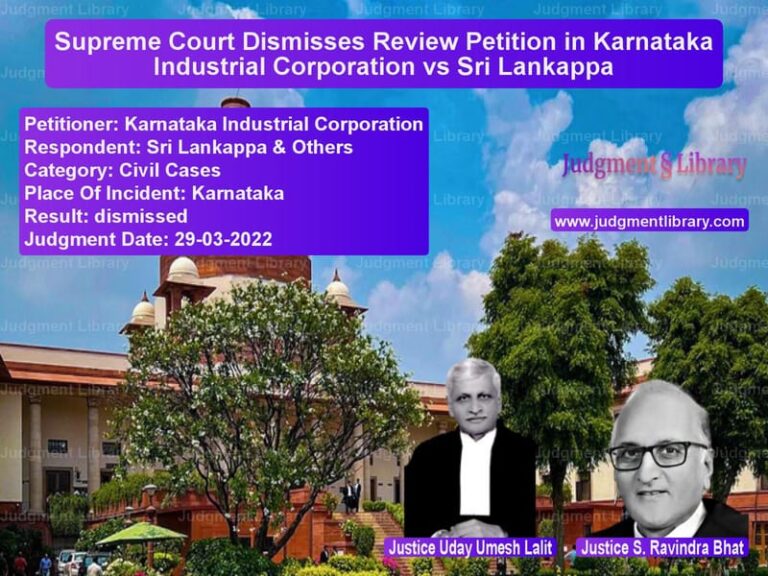Supreme Court Rules on Contempt of Court: Limits of Free Speech and Judicial Authority
The Supreme Court of India, in its ruling on Re: Vijay Kurle & Ors., addressed critical issues regarding contempt of court and the boundaries of free speech. This case was initiated as a suo motu contempt petition, where the Court took notice of certain statements and letters that allegedly scandalized the judiciary.
Background of the Case
The case originated from letters and statements made by advocates Vijay Kurle, Rashid Khan Pathan, and others, which accused Supreme Court judges of bias and corruption. These statements were widely circulated and were seen as an attempt to undermine public confidence in the judiciary.
In response, the Supreme Court issued contempt proceedings, arguing that such statements, when baseless, amounted to an attack on the authority of the judiciary. The case brought to light the delicate balance between the right to free speech and the judiciary’s power to punish for contempt.
Legal Issues Considered
- Whether the statements made by the contemnors amounted to contempt of court under the Contempt of Courts Act, 1971.
- Whether the Supreme Court could take suo motu cognizance of contempt without a formal complaint.
- The extent to which free speech rights protect criticism of the judiciary.
Arguments by the Petitioners
The petitioners contended:
- That the statements in question went beyond fair criticism and instead sought to scandalize the Court.
- That the authority of the judiciary must be protected to ensure public confidence in the legal system.
- That allowing such statements to go unpunished would set a dangerous precedent, encouraging unfounded attacks on judicial integrity.
Arguments by the Respondents
The respondents defended their statements on the following grounds:
- That they were exercising their right to free speech under Article 19(1)(a) of the Constitution.
- That their criticisms were made in the public interest and were not intended to undermine the judiciary.
- That punishing them for contempt would have a chilling effect on legitimate criticism of the judiciary.
Supreme Court’s Observations
The Supreme Court, in its ruling, observed:
“The power to punish for contempt is not to be used to stifle fair criticism, but where criticism crosses the boundary into scandalizing the Court, it becomes necessary to act.”
- The Court reaffirmed that while fair criticism of judgments is permissible, attributing malafide motives to judges without evidence is not.
- It noted that contempt powers are essential to maintaining the dignity and independence of the judiciary.
- The Court emphasized that free speech is subject to reasonable restrictions and does not extend to making baseless allegations against judges.
Final Judgment
The Court held that the statements made by the contemnors were indeed contemptuous. It ruled:
“No person has the right to attribute motives to a Judge or to question the integrity of a Judge in a manner that scandalizes the court.”
Accordingly, the contemnors were convicted of criminal contempt and sentenced as per the Contempt of Courts Act.
Implications of the Judgment
The ruling has significant implications for legal ethics and the boundaries of free speech:
- It clarifies that while judicial accountability is essential, attacks on judges must be based on substantiated facts.
- It reinforces the judiciary’s power to act against statements that erode public confidence in the legal system.
- It underscores that the power of contempt must be exercised judiciously, ensuring that it is not used to silence genuine criticism.
Constitutional Analysis
The judgment aligns with the constitutional principles enshrined in Articles 129 and 142, which empower the Supreme Court to punish for contempt. However, the Court also acknowledged that the power of contempt must not be misused to stifle constructive criticism of judicial decisions.
Conclusion
The Supreme Court’s ruling in Re: Vijay Kurle & Ors. reaffirms the balance between judicial authority and free speech. It upholds the principle that courts must remain open to criticism but must also act against those who attempt to undermine judicial integrity without justification.
This judgment is expected to shape the jurisprudence on contempt of court and reinforce public confidence in the judicial system.
Petitioner Name: Suo Motu Contempt Petition.Respondent Name: Vijay Kurle & Ors..Judgment By: Justice Deepak Gupta.Place Of Incident: India.Judgment Date: 27-04-2020.
Don’t miss out on the full details! Download the complete judgment in PDF format below and gain valuable insights instantly!
Download Judgment: Suo Motu Contempt Pe vs Vijay Kurle & Ors. Supreme Court of India Judgment Dated 27-04-2020.pdf
Direct Downlaod Judgment: Direct downlaod this Judgment
See all petitions in Contempt Of Court cases
See all petitions in Judgment by Deepak Gupta
See all petitions in allowed
See all petitions in supreme court of India judgments April 2020
See all petitions in 2020 judgments
See all posts in Criminal Cases Category
See all allowed petitions in Criminal Cases Category
See all Dismissed petitions in Criminal Cases Category
See all partially allowed petitions in Criminal Cases Category







